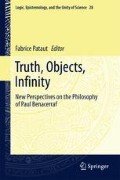Abstract
It seems reasonable to assume that mathematical infinity was not the objective of Zeno’s dichotomy (in any of its variants); however, some kind of mathematical infinity was already at stake in his celebrated arguments. Aristotle proposed a solution to Zeno’s dichotomy by introducing what we now call one-to-one correspondences, the key instrument of modern infinitist mathematics. But Aristotle, more a naturalist than a platonist, finally rejected the method of pairing the elements of two infinite collections (in the case at hand, points and instants) and introduced instead the distinction between actual and potential infinities.
Access this chapter
Tax calculation will be finalised at checkout
Purchases are for personal use only
References
Amelino-Camelia, G. (2001). Testable scenario for relativity with minimum length. Physics Letter, B510, 255–263.
Benacerraf, P. (1962). Tasks, super-tasks, and modern eleatics. The Journal of Philosophy, 59(24), 765–784.
Black, M. (1950–1951). Achilles and the tortoise. Analysis, 11(5), 91–101.
Cantor, G. F. (1874). Über eine Eigenschaft des Inbegriffs aller reellen algebraischen Zahlen. Journal für die reine und angewandte Mathematik, 77, 258–262.
Cantor, G. F. (1885). Über verschiedene Theoreme aus der Theorie der Punktmengen in einem n-fach ausgedehnten stetigen Raume Gn. Acta Mathematica, 7, 105–124.
Cantor, G. F. (1890–1891). Über eine elementare Frage der Mannigfaltigkeitslehre. Jahresbericht der Deutschen Mathematiker-Vereiningung, Band I, 75–78.
Cantor, G. F. (1955). Contributions to the founding of the theory of transfinite numbers (Beiträge zur Begründung der transfiniten Mengenlehre, parts I and II, Philip E. B. Jourdain, English Trans.). New York: Dover.
Clark, P., & Read, S. (1984). Hypertasks. Synthese, 61(3), 387–390.
Hallet, M. (1984). Cantorian set theory and limitation of size. Oxford: Oxford UP.
Antonio León-Sánchez (2013). Infinity at stake—Selected arguments on the actual infinity hypothesis. Madrid: Bubok Publishing.
Magueijo, J., & Smolin, L. (2003). Generalized Lorentz invariance with an invariant energy scale. Physical Review D, 67(4), 044017.
Majid, S. (2008). Quantum space-time and physical reality. In S. Majid (Ed.), On space and time (pp. 56–140). Cambridge: Cambridge UP.
Maudlin, T. (2011). Quantum non-locality and relativity. Oxford: Wiley-Blackwell.
Moore, A. W. (2001). The infinite. New York: Routledge.
Mora, F. (2007). Como funciona el cerebro. Madrid: Alianza.
Pickover, C. A. (1995). Keys to infinity. New York: Wiley.
Raichle, M. E. (2006). The brain’s dark energy. Science, 319, 1249–1250.
Smolin, L. (2007). The trouble with physics. London: Penguin Books.
Taylor, R. (1951). Mr Black on temporal paradoxes. Analysis, 12(2), 38–44.
Thomson, J. F. (1954–1955). Tasks and super-tasks. Analysis, 15(1), 1–13.
Watling, J. (1952). The sum of an infinite series. Analysis, 11(2), 39–46.
Zeki, S. (1995). Una vision del cerebro. Barcelona: Ariel.
Author information
Authors and Affiliations
Corresponding author
Editor information
Editors and Affiliations
Rights and permissions
Copyright information
© 2016 Springer International Publishing Switzerland
About this chapter
Cite this chapter
León-Sánchez, A., C. León-Mejía, A. (2016). Supertasks, Physics and the Axiom of Infinity. In: Pataut, F. (eds) Truth, Objects, Infinity. Logic, Epistemology, and the Unity of Science, vol 28. Springer, Cham. https://doi.org/10.1007/978-3-319-45980-6_11
Download citation
DOI: https://doi.org/10.1007/978-3-319-45980-6_11
Published:
Publisher Name: Springer, Cham
Print ISBN: 978-3-319-45978-3
Online ISBN: 978-3-319-45980-6
eBook Packages: Religion and PhilosophyPhilosophy and Religion (R0)

